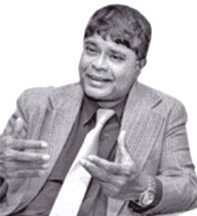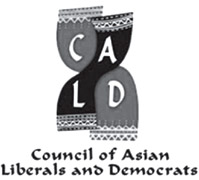DEMOCRACY: Damage control
Text of a presentation
by Prof. Rajiva Wijesinha, MP at the Council of Asian Liberals and
Democrats Conference on Transitions to Democracy Managing Burma’s
Political Transition: The Challenges Ahead November 16-19, 2012,
Bangkok, Thailand
 |
|
Prof.
Rajiva Wijesinha, MP |
 The news from many parts of Asia has been full recently of ethnic or
rather sectarian conflict. In Thailand and the Philippines, there have
been Southern insurgencies, with Muslim populations asserting a separate
identity from Buddhists and Christians respectively. Indonesia has
recently found places of worship being closed by a fundamentalist
dispensation in Aceh. In both Bangladhesh and Burma, there have been
riots, of Buddhists again Muslims or vice versa. And in Pakistan the
struggle between Shias and Sunnis seems to be endless, a phenomenon we
see in many countries of West Asia too. The news from many parts of Asia has been full recently of ethnic or
rather sectarian conflict. In Thailand and the Philippines, there have
been Southern insurgencies, with Muslim populations asserting a separate
identity from Buddhists and Christians respectively. Indonesia has
recently found places of worship being closed by a fundamentalist
dispensation in Aceh. In both Bangladhesh and Burma, there have been
riots, of Buddhists again Muslims or vice versa. And in Pakistan the
struggle between Shias and Sunnis seems to be endless, a phenomenon we
see in many countries of West Asia too.
In Sri Lanka we could say we were used to this, as we emerge from a
thirty year long civil war, often characterized as being between
Sinhalese and Tamils. Yet that would be erroneous, for though the
Liberation Tigers of Tamil Eelam presented themselves as the champions
of the Tamil people, Tamils were among their prominent victims. In
setting themselves up as the sole representatives of the Tamil people,
they destroyed moderate Tamil forces, killing several leading
politicians and browbeating others into submission.
But it would also be misleading to claim that there was no ethnic
tension in the country. The Tigers became prominent precisely because
there was no harmony and no union within Sri Lanka. Since our democracy
was based on a British model, we did not have checks and balances built
in, as had occurred with the United States, which had to build up a
constitution in the context of conflicting claims, from states with
different priorities.
Parliamentary elections
Our democracy was majoritarian, which meant that it could be taken
possession of by whoever obtained a majority in Parliamentary elections.
Since we had the first past the post system, and since most
constituencies were what the British would describe as marginals, on
several occasions we had massive majorities in Parliament on the basis
of small majorities in the popular vote. And so we had measures that
were in theory democratic, ie were based on increasing the power of the
people, but which took away power from minorities.
Thus we had language policies that made employment more difficult for
minorities, we had educational policies that made higher education less
accessible, and we had land distribution that favoured the majority.
The manner in which language became a problem is instructive, for it
was also based on egalitarian policies that ended up promoting
privilege. Over 50 years ago Sri Lanka decided to make mother tongue
education compulsory and, far from Sinhalese being imposed on Tamils,
both languages were on a par for the purpose. But this meant that, when
Sinhalese became the official language, many Tamils had no knowledge of
it, and could not therefore obtain state employment. And, in a context
in which the state was the principal employer, given the statist
socialism that had engulfed us, Tamils certainly suffered.
The solution to the problem therefore required two steps. In 1987,
Tamil was also made an official language. But monolingualism continued
to dominate in education, until in the nineties we began to teach
children the other language in schools. Most recently we have embarked
on a policy of trilingualism, which will make communication easier and
enhance employment opportunities for all. But I should note that the
state is still not implementing that policy properly, in part because it
still commands a monopoly with regard to teacher training even though it
has proved woefully inefficient in ensuring an adequate supply of
teachers in essential subjects. So, unless this is changed soon, and an
adequate supply of teachers provided to schools nationwide, the problem
will continue to haunt us.
Infrastructural development
The same goes for educational opportunity. Given that we still have a
virtual state monopoly on education, we are depriving many bright
youngsters of the opportunity to equip themselves satisfactorily for
jobs in the modern world. This causes resentment, and all over the
country too, as we saw through two Southern Sinhalese youth
insurrections in addition to the protracted struggle of the Tigers in
the North. We have also failed to keep pace with modern requirements,
and are woefully behind in science and technology, without which our
youngsters will not be able to contribute actively to economic and even
infrastructural development at the more advanced levels. Stuck still in
the mindset of an elite Britain, a mindset that Britain has now
overcome, we provide high level qualifications only to a limited number,
in terms of academic approaches, rather than the vocational and
technical excellence we should be nourishing.
All this causes dissatisfaction and disharmony, and will continue to
affect the unity of the country.
To be continued
|







